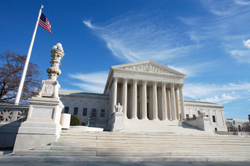
Jun 25, 2013 | Real Estate, Land Use & Construction Law
Today, the U.S. Supreme Court (“SCOTUS”) issued its opinion in Koontz v. St. Johns River Water Management District, No. 11-1447, slip op., 570 U.S. ___ (2013). Koontz, a victory for the property owner, is an important property rights case affecting the government’s...

Jun 20, 2013 | Real Estate, Land Use & Construction Law
Arlington Commercial Parking Working Group It is no secret Arlington’s workforce is changing how they get to work. In recent years, there has been a shift from single-occupancy vehicle (“SOV”) trips to other transportation modes, such as Metrorail, bicycling, and bus....
Mar 10, 2013 | Real Estate, Land Use & Construction Law
In Part I of this blog post, we discussed the varied interests of the landlord and the tenant’s lender in the tenant’s personal property located at the premises in the context of a commercial lease. Part II below will discuss suggested compromise solutions and a...
Jan 29, 2013 | Real Estate, Land Use & Construction Law
Commercial real estate landlords and the lenders for their tenants have competing interests with respect to the tenant’s personal property located at the demised premises. The landlord is looking to secure the tenant’s rental obligations by taking a lien...
Jul 12, 2012 | Real Estate, Land Use & Construction Law
Self-Help. Ok or Not? “Self-help,” in a leasing context, typically refers to the landlord’s historical remedy of locking out a defaulting tenant and obtaining possession of the premises without going through judicial procedures. Traditionally under the common law, a...
Jun 22, 2012 | Real Estate, Land Use & Construction Law
In this series we have been examining a landlord’s duty to mitigate their damages after a default by the tenant. Earlier we looked at the laws in the District of Columbia and Virginia. An examination of Maryland’s law is below. Maryland Maryland courts...




